| Declassified documents by the United States government.- Report of CIA Chilean Task Force
Activities, 15 September to 3 November 1970.
| 18 November 1970 SUBJECT: Report on CIA Chilean Task Force
Activities, 15 September to 3 November 1970
1. General
a. On 15 September 1970, CIA was
directed to try to prevent Marxist Salvador Allende's assent to the Chilean presidency on
3 November. This effort was to be independent of concurrent endeavors being undertaken
through, or with the knowledge of, the 40 Committee, Department of State, and Ambassador
Korry.
b. Briefly, the situation at that
time was the following:
-- Allende had attained a plurality
of only some 40,000 in the Chilean popular vote for president. Jorge Alessandri, a
conservative and the runner-up, would face Allende in a Congressional run-off on 24
October. The run-off winner would be invested as president on 3 November. |
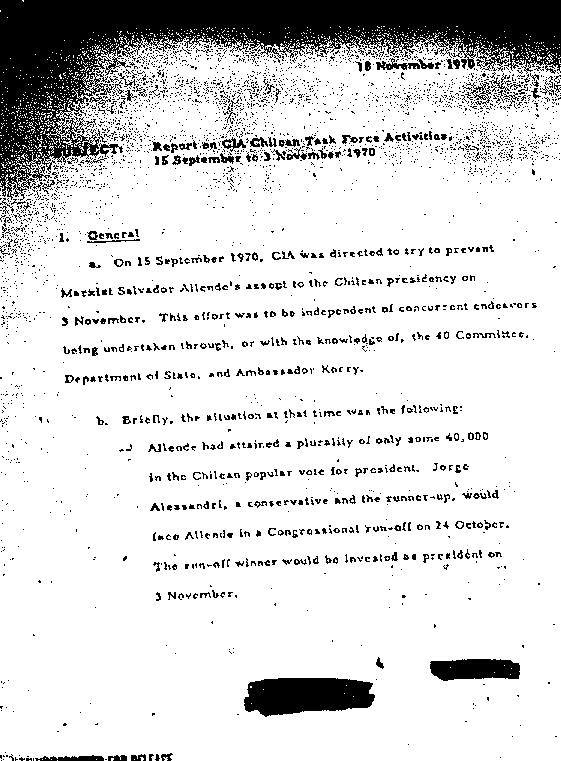 |
| -- Allende's
designation as president by Congress was very probable given all known factors in the
Chilean political equation. --
Given the dismal prospects of a political formula being worked out to prevent Allende's
designation as president by Congress, remaining alternatives centered around overcoming
the apolitical, constitutional-oriented inertia of the Chilean military.
-- U.S. Government intentions were
highly suspect, particularly in Allende and certain government sectors. Suspicions
extended to all Americans in Chile for whatever declared purpose. In addition, the Chilean
military were being monitored quite closely by the Allende forces for warning signals of
any interventionist proclivities.
2. Special Organization
a. A Chilean Task Force was
assembled and functioning three days after CIA was assigned the mission. It was headed by
[several words deleted] and highly-qualified CIA [several words deleted] recalled from
their [several words deleted] |
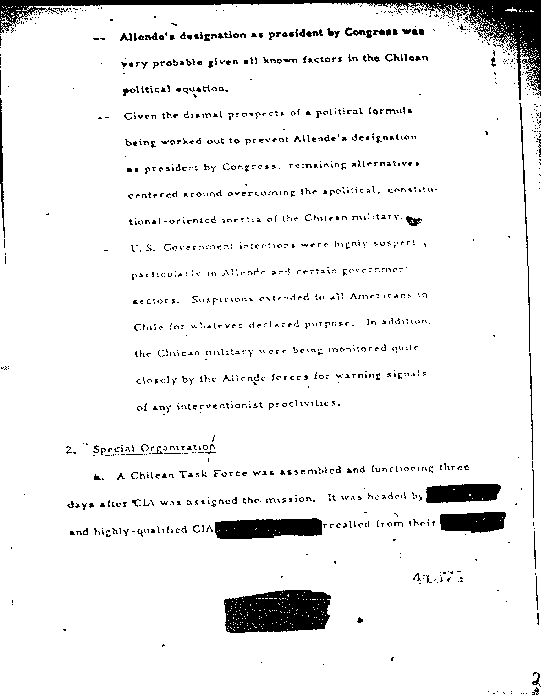 |
| posts specifically for
this purpose. A special communications channel was set up simultaneously to Santiago,
Chile, and Buenos Aires, Argentina, to handle sensitive cable traffic for the Task Force. b. [1 line deleted] It consisted of four CIA
officers with the appearance, language, and experience to sustain the fiction of various
foreign nationalities. They were recalled from the overseas posts to Washington, briefed,
and inserted individually into Chile [1 line deleted] nationals. In Santiago, their only
U.S. contact was a CIA officer who had resided in Santiago [1 line deleted] established
contact with Chilean intermediaries or principals interested in promoting a military coup.
c. By a special (and unique)
arrangement requested by CIA, the U.S. Army Attache in Santiago was placed under
operational direction of the CIA Chief of Station there. His assistance and Chilean
military contacts were invaluable in this program.
[ page 4 missing ] |
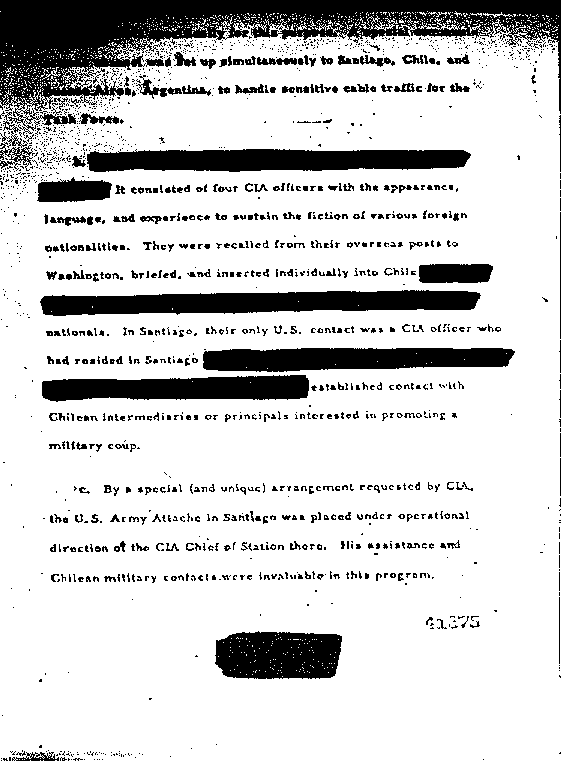 |
| selected for the
presidency by Congress, he (Alessandri) would resign. The thrust of CIA's endeavors, then,
was to use every plausible pressure combined with inducements to move Frei down this path.
To this end, virtually overnight CIA mobilized an interlocking political action and
propaganda campaign designed both to goad and entice Frei into following through on the
re-election gambit. c.
At the same time, recognizing the fallibilities of Frei, CIA focused on provoking a
military coup. This undertaking was segregated from that of the Frei re-election gambit
with the intention that it be pursued independently of Frei if necessary, but with his
acquiescence if possible. [4 lines deleted]
4. Propaganda Campaign
a. The propaganda campaign was
tailored to generating concern about Chile's future in terms which would condition the
thinking and actions of the three key elements in the Chilean political equation: |
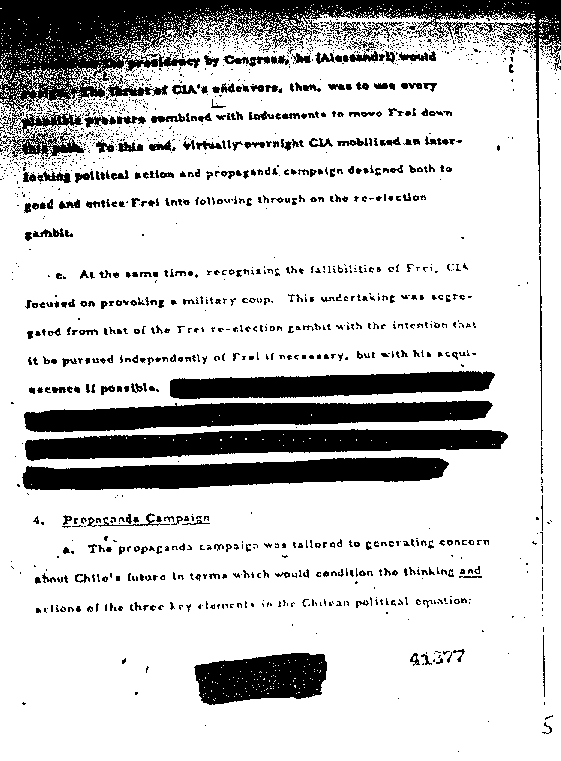 |
| Frei himself, the
Chilean political elite, and the Chilean military (the latter two of which could well
bring collateral influence to bear on Frei). Each of these elements had hastened to
rationalize its acceptance of an Allende presidency. Their palliative was the built-in
checks and balance of Chile's demonstrated reverence for democracy and constitutionality,
sweetened by Allende's promise to honor these traditions. b. After the 4 September popular vote, the
world press had tended to treat the prospect of witnessing the first freely-elected
Marxist head of state take office as a curious aberration of democracy rather than a
politically significant event. Press interest and coverage was relatively light until the
Allende forces fortuitously provided an attractive issue which could be exploited. By 15
September, it became apparent that Allende was conducting a rather blatant campaign to
intimidate the Chilean information media through threats of assassination and violence,
takeovers by so-called worker organizations, and ultimatums to the management of
newspapers and radio stations. Allende's purpose was to smother any opposition to this
election by Congress and to take advantage of that |
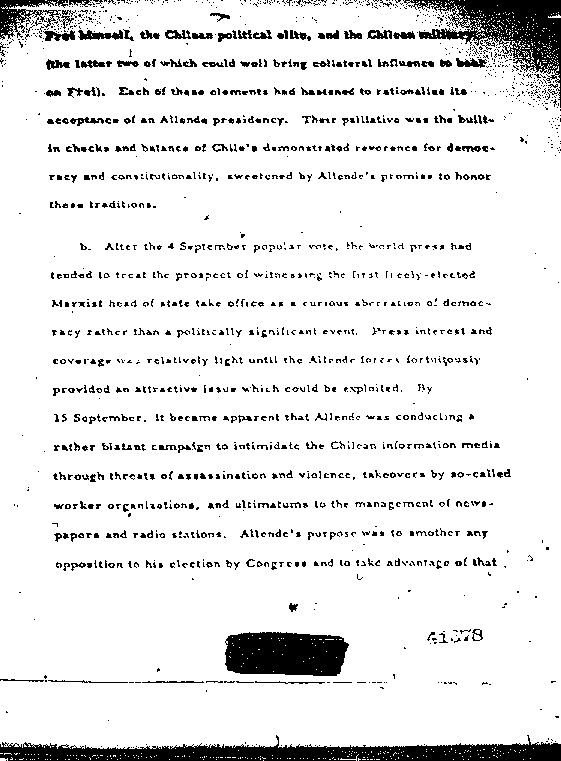 |
| peculiarly Latin, and
pronounced Chilean, propensity to jump on an accelerating bandwagon -- ideals and the
country's welfare to the contrary. A major target of Allende was "El Mercurio",
the most prestigious newspaper in Chile and the major opposition voice to Allende up to
that time. CIA mounted a propaganda campaign centered around "El Mercurio" and
the issue of Allende brazenly taking his first step in "communizing" Chile by
attacking freedom of the press and, worse, with the election still unsettled. Covert
action resources were used to launch -- Cables of support/protest from leading newspapers throughout
Latin America to "El Mercurio".
-- A protest statement from the
International Press Association [3 lines deleted] "Freedom of the press in Chile is
being strangled by Communist and Marxist forces and their allies.")
-- World press coverage of the
International Press Association protest and on the details of the |
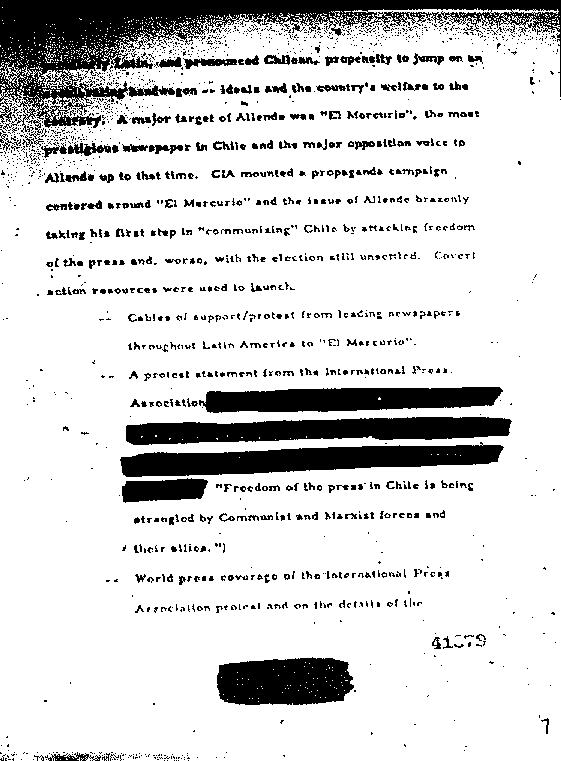 |
| Communist efforts to
seize control of the Chilean press. -- A program of journalists -- actual agents and otherwise --
travelling to Chile for on-the-scene reporting. (By 28 September, CIA had in place in, or
enroute to, Chile 15 journalist agents from 10 different countries. This cadre was
supplemented by 8 more journalists from 5 countries under the direction of high level
agents who were, for the part, in managerial capacities in the media field.)
As a result of the ensuing furore,
Allende -- sensitive to world opinion and attempting to project the image of a moderate,
non-dogmatic socialist -- decided to become more circumspect. By 25 September,
heavy-handed intimidation of the press had virtually ceased.
c. Allende's show of strength had
made its point however; the Chilean press, including "El Mercurio", never did
regain its resiliency and remained thoroughly muted from thereon out. Lacking the usual
forums for spontaneous generation and replay of |
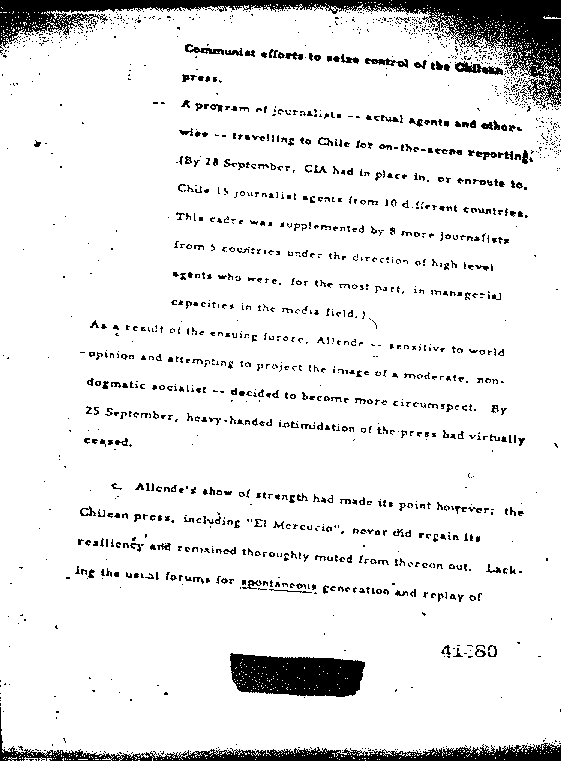 |
| propaganda inside
Chile, CIA had to rely increasingly on its own resources: -- an underground press dependent upon
direct mail distribution;
-- placement of individual news
items through agents against the resistance of a cowed management;
-- financing of a new, albeit
small, newspaper;
-- subsidy of an anti-Allende
political group and its radio programs, political advertisements, and political rallies;
and
-- direct mailing of foreign news
articles to President Frei, Mrs. Frei, selected military leaders, and the Chilean domestic
press.
This effort did not, and could not,
replace a Chilean press, fully operative and free of restraint. Virtually alone, it did
keep the voice of public opposition alive inside Chile for coup purposes during the final
weeks of this period.
d. The magnitude of the propaganda
campaign mounted during this six week period in the Latin American and European media -- |
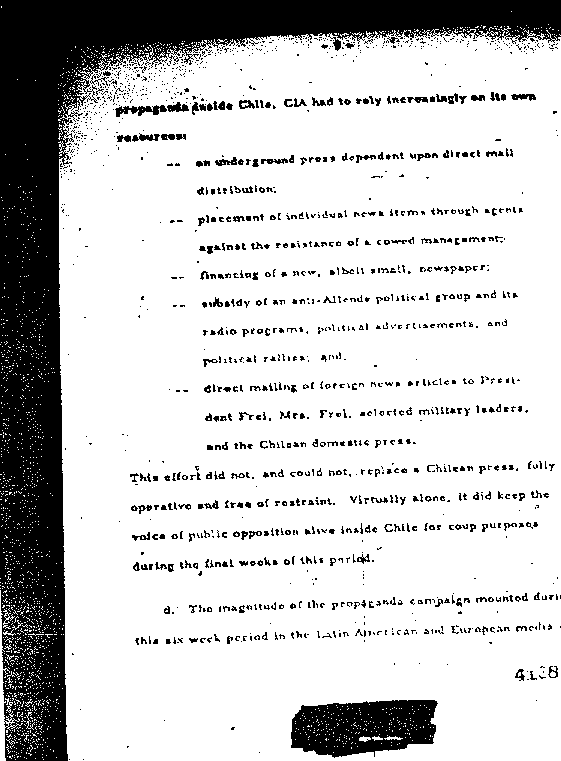 |
| aside from the U.S.,
the two "outside" areas with, by far, the greatest influence on Chile -- is
evident from the fact that only partial returns show 726 articles, broadcasts, editorials,
and similar items as a direct result of agent activity. Just how many of these items were
replayed is not known [2 lines deleted] Nor, has CIA any idea of the scope of the
immeasurable multiplier effect -- that is, how much its "induced" news focused
media interest on the Chilean issues and stimulated additional coverage -- except that,
even by conservative standards, this contribution must have been both substantial and
significant. e.
Special intelligence and "inside" briefings were given to U.S. journalists in
deference to the international influence of the U.S. media. Particularly noteworthy in
this connection was the Time cover story which owed a great deal to written materials and
briefings provided by CIA. The Time correspondent in Chile who was providing much of the
background material for the story apparently accepted Allende's protestations of
moderation and constitutionality at face value. CIA briefings in Washington |
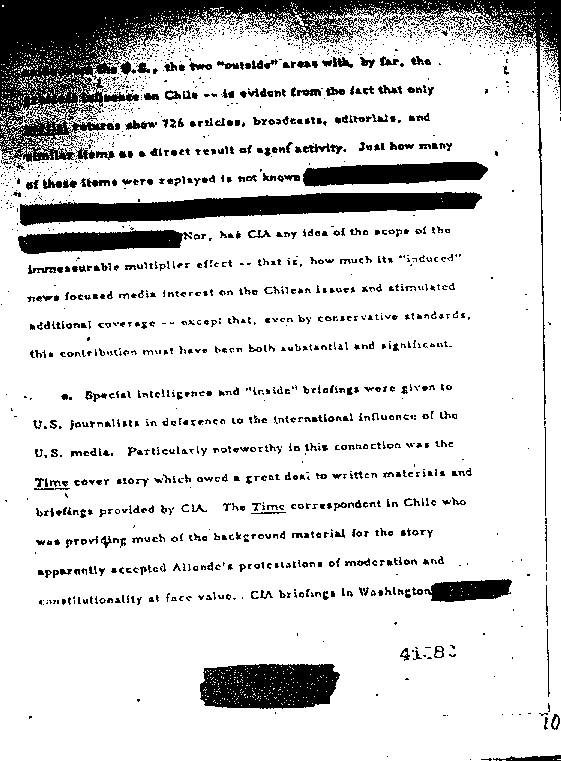 |
| [1 line deleted]
changed the basic thrust of the story in the final stages according to another Time
correspondent. It provoked Allende to complain on 13 October, "We are suffering the
most brutal and horrible pressure, both domestic and international," singling out
Time in particular as having "openly called" for an invasion of Chile. 5. Political Action
a. The political action program had
only one purpose: to induce President Frei to prevent Allende's election by the Congress
on 24 October and, failing that, to support -- by benevolent neutrality at the least and
conspiratorial benediction at the most -- a military coup which would prevent Allende from
taking office on 3 November. Realistically, the task was one of attempting to recast Frei,
as a political personality, in a role demanding decisiveness and "machismo" to a
degree that, thus far, had eluded him. Pressures from those whose opinion and/or approval
he valued -- in combination with adequate propaganda orchestrations -- represented the
only hope of converting Frei. |
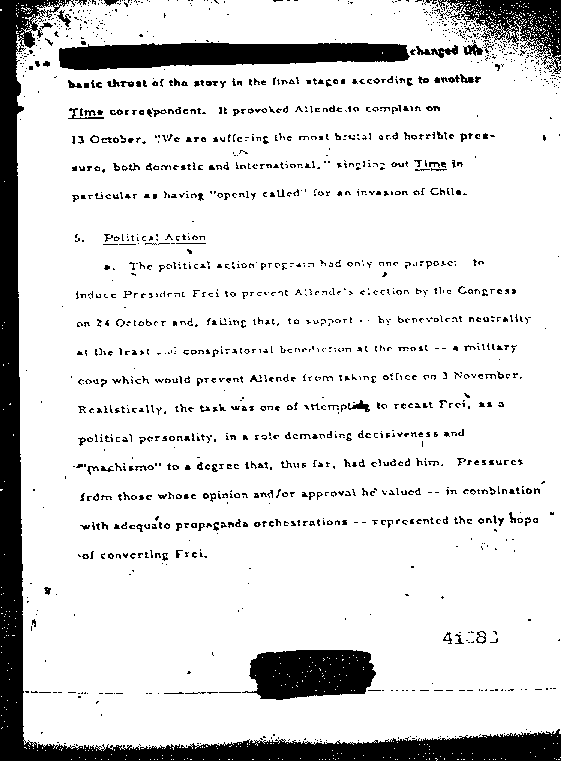 |
| [4 lines deleted] -- Allende as president would be an
unparalleled disaster for Chile (Frei agreed).
-- Frei had both the power and
obligation to prevent this.
-- [5 lines deleted]
-- [3 lines deleted]
-- In the event Frei's re-election
gambit succeeded, the U.S. Government would be prepared to provide substantial support for
Frei's presidential campaign. |
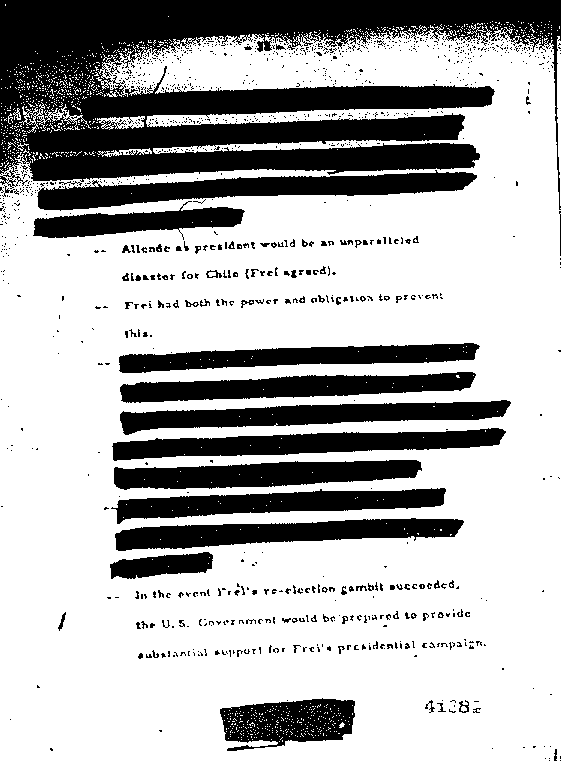 |
| [6 lines deleted] c. In Europe and Latin America, prominent
and influential members of the Christian Democratic movement as well as the Catholic
Church were prompted to visit Frei or send personal messages to him urging that he save
Chile. Some of these endeavors were the following:
-- [8 lines deleted] |
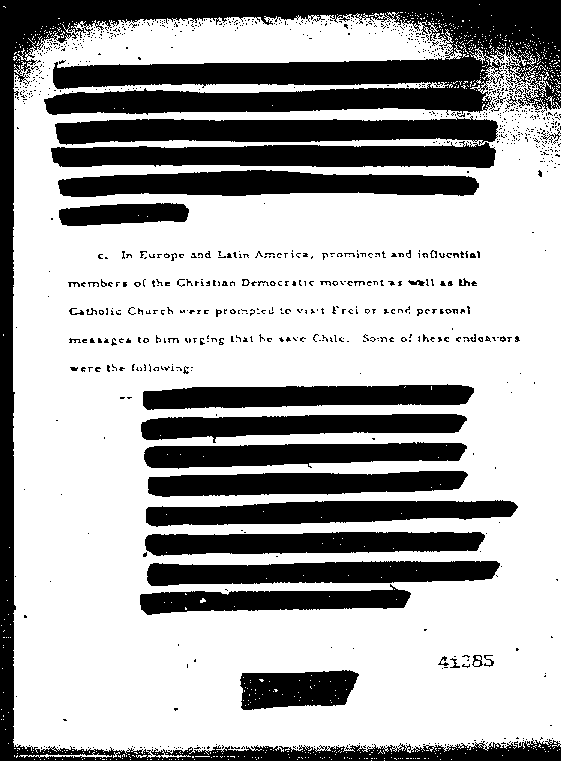 |
| -- The West German
Christian Democratic Party -- which enjoyed special equities with Frei by virtue of
generous support to the Christian Democrats in Chile over a range of many years --
dispatched several top-level emissaries to Chile. They contacted Frei and other Christian
Democratic leaders in Chile [several words deleted] -- [5 lines deleted]
-- [3 lines deleted]
-- [3 lines deleted] |
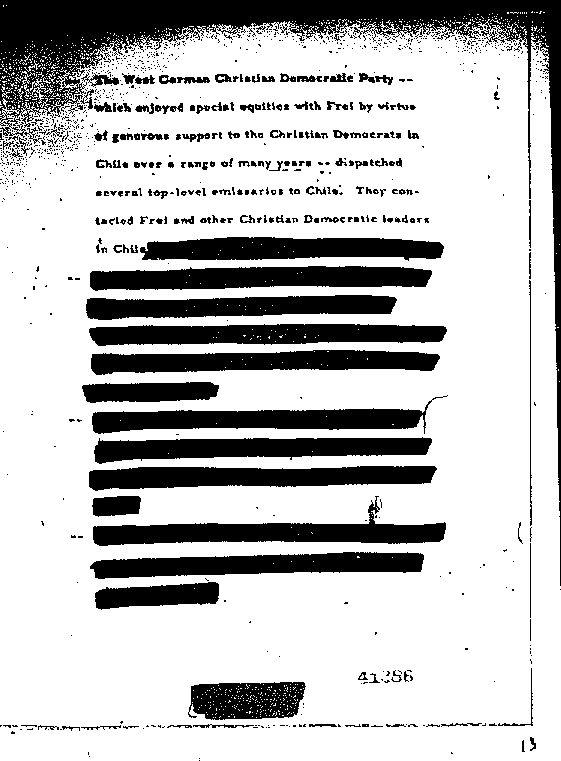 |
| -- [several words
deleted] one of the international figures in Catholicism most respected by Frei, sent a
personal message indicating that Frei and his party must oppose Marxism. -- [several words deleted] of the Italian
Christian Democratic Party -- which had good fraternal relations with Frei and his party
-- refused to intervene. (He said it was a hopeless situation and he saw no point in
risking his reputation in a lost cause.)
Collateral efforts were made to
influence Frei or those close to Frei, such as:
-- Influential lay Catholics sent
messages to or visited the Vatican.
-- [several words deleted] through
a series of lay and clerical pressures from other countries, was dissuaded from ceding an
Allende victory prior to his Congressional election actually taking place.
-- Telegrams were sent Mrs. Frei
from women's groups in other Latin American countries. |
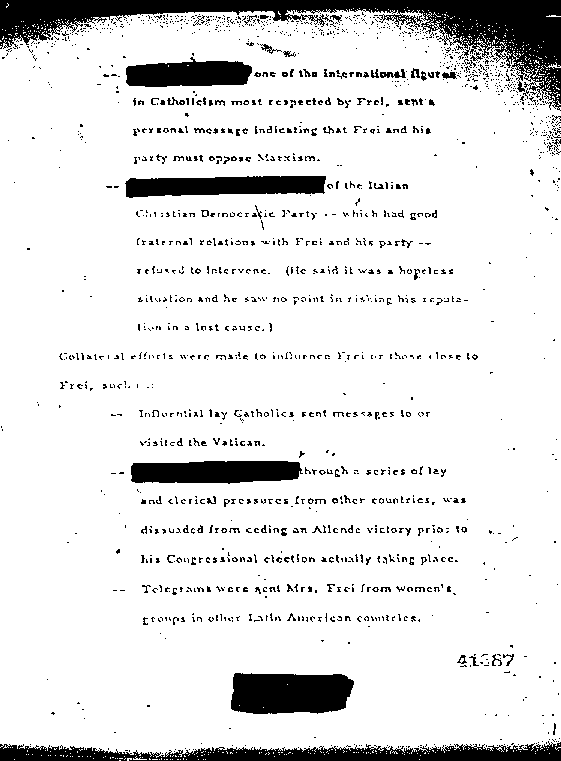 |
| -- Foreign press items
were mailed directly to Frei, Mrs. Frei, and Christian Democratic Congressmen in Chile. -- Intelligence was surfaced indicating
that, once in power, the Communists intended to denigrate Frei as the first step in the
dissolution of his party.
d. In spite of everything, Frei
never asserted himself. Indeed, he failed to attend or to influence otherwise the 3-4
October Congress of his party at which time it was decided by a substantial margin to make
a deal with Allende. With that decision, the Frei re-election gambit died and
constitutional alternatives had been exhausted. Subsequently, Frei did manage to confide
to several top-ranking military officers that he would not oppose a coup, with a guarded
implication he might even welcome one. Yet, when a coup opportunity and situation
presented itself upon the assassination of Army Commander in Chief Schneider, Frei moved
quickly away from it.
6. Military Coup
a. After early October -- absent
any evidence that Frei was responding, politically speaking, to artificial respiration --
a |
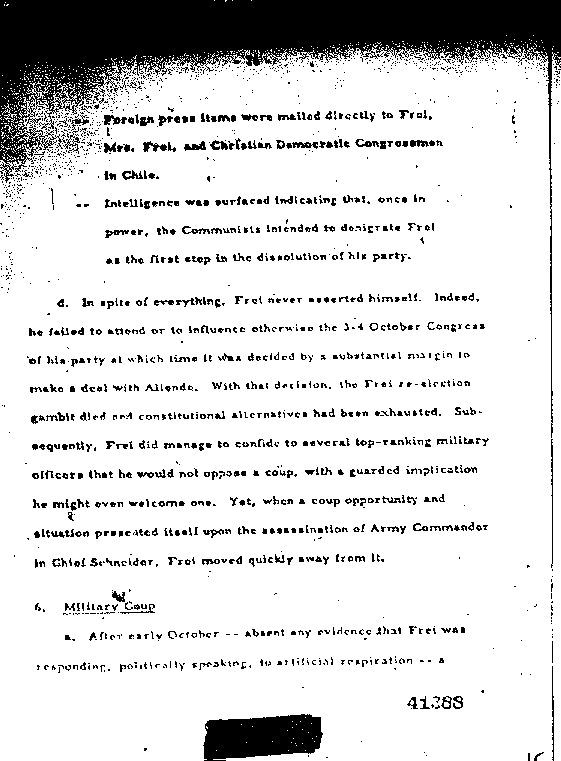 |
| military coup
increasingly suggested itself as the only possible solution to the Allende problem.
Anti-Allende currents did exist in the military and the Carabineros, but were immobilized
by: -- the
tradition of military respect for the Constitution;
-- the public and private stance of
General Schneider, Commander in Chief of the Army, who advocated strict adherence to the
Constitution;
-- fear of the reaction of
non-commissioned officers who tended to harbor pro-Allende sympathies; and,
-- a strong propensity to accept
Allende blandishments to the effect that the military had little to fear from him.
Although individual officers among
the top leadership of the military and Carabineros were pre-disposed to take action, they
felt the Army was central to a successful coup, and, as long as General Schneider remained
the head of the Army, the Army could not be counted upon. General Schneider's attitude
could only be changed through the personal intervention and forceful advocacy of a coup by
President Frei: something, it became obvious, the latter was most unlikely to bring
himself to do. |
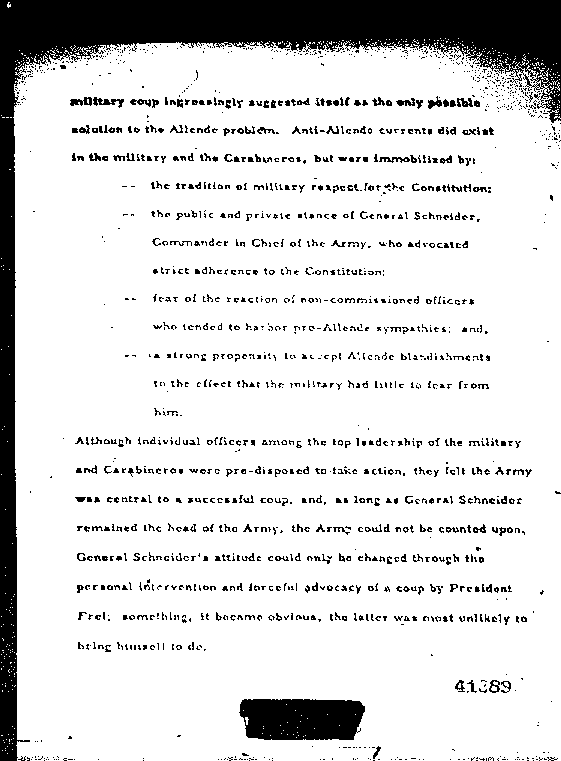 |
BACK
The Crimes of the Chilean Generals |